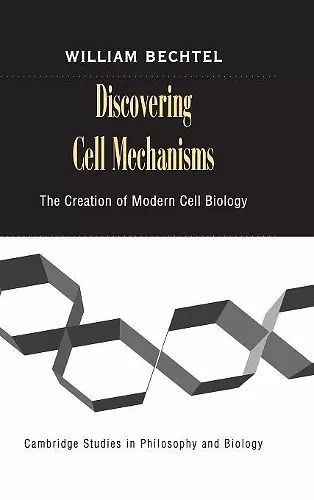Discovering Cell Mechanisms
The Creation of Modern Cell Biology
Format:Hardback
Publisher:Cambridge University Press
Published:10th Oct '05
Currently unavailable, and unfortunately no date known when it will be back
This hardback is available in another edition too:
- Paperback£24.99(9780521729444)

Bechtel emphasises how mechanisms were discovered by cell biologists and the instruments that made these inquiries possible.
Between 1940 and 1970, pioneers in the new field of cell biology discovered the operative parts of cells and their contributions to cell life. William Bechtel emphasises how mechanisms were discovered by cell biologists, focusing especially on the way in which new instruments made these inquiries possible.Between 1940 and 1970 pioneers in the new field of cell biology discovered the operative parts of cells and their contributions to cell life. They offered mechanistic accounts that explained cellular phenomena by identifying the relevant parts of cells, the biochemical operations they performed, and the way in which these parts and operations were organised to accomplish important functions. Cell biology was a revolutionary science but in this book it also provides fuel for yet another revolution, one that focuses on the very conception of science itself. Laws have traditionally been regarded as the primary vehicle of explanation, but in the emerging philosophy of science it is mechanisms that do the explanatory work. Bechtel emphasises how mechanisms were discovered, focusing especially on the way in which new instruments made these inquiries possible. He also describes how new journals and societies provided institutional structure to this new enterprise.
This volume…will be useful not only to cell biologists interested in the embryology of their field, but also to theorists and historians of science concerned with the boundaries of fields of intellectual inquiry. -Choice
"For decades historians have been preoccupied with genetics and molecular biology. However, mitochondria, ribosomes, Golgi bodies, and lysosomes explain the life processes of the cell; DNA does so only peripherally. This is their much needed story." -Douglas Allchin, Isis
"Historians will appreciate Bechtel's thorough research in the archives of the Rochefeller Foundation and the American Society for Cell Biology, as well as his use of oral history interviews with some of the principal scientists...Cell biologists especially welcome this new history of their field." -Lindley Darden, University of Maryland, Journal of the History of Biology
ISBN: 9780521812474
Dimensions: 235mm x 163mm x 27mm
Weight: 575g
334 pages